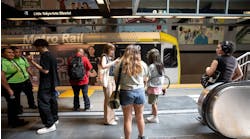Denver RTD looks to its partnerships to define a shared future for the region
Due to the COVID-19 pandemic, the Denver Regional Transportation District (RTD) anticipates a shortfall of $215 million in 2021 due to projected sales and use taxes and fare revenue shortfalls, as well as the operational impacts resulting from social distancing protocols.
To this extent, RTD says the pandemic has had a significant impact on its financial outlook and, subsequently, its ability to provide the same service offerings it has in the past.
Given this difficult outlook, RTD says it must develop a more focused set of core services to meet its role as an essential transportation services provider to those who need and use us most. This new focus will result in reducing or suspending service in parts of the district where it previously existed.
As the agency approaches these difficult decisions, RTD recognizes there will be a continued desire for public transit services where it has been scaled back. Therefore, the agency says it will look to partner with public and private stakeholders to help meet demand in a more constrained financial future.
RTD’s Transit Oriented Communities (TOC) division has broken down past partnerships into the following five categories:
- Transit Operating Infrastructure – including bus-only lanes, transit signal priority technology and traffic intersection queue jumps that improve transit reliability and speed.
- First and Last Mile Infrastructure – such as secure bicycle parking, sidewalks and micromobility or bike lanes to help potential customers access RTD services.
- Transit-Oriented Development – such as projects at Olde Town Arvada and Alameda Stations that create population density and commercial activity directly at station locations.
- Service Buy-Ups – whereby local governments and/or nonprofits subsidize the operating cost to create new services, such as the Wagon Road FlexRide service in Adams County; or add greater frequency to existing services, as has been done for multiple routes in Boulder County.
- Public-Private Partnerships – sometimes known as P3s, these arrangements often help to finance large-scale construction projects, including the University of Colorado A, B and G commuter rail lines or the U.S. 36 Express Lanes Project, completed in cooperation with the Colorado Department of Transportation (CDOT). Other public-private partnerships, such as those recently forged with Uber and Transit app, help customers more easily access electronic fare media, and are examples of effective partnerships that improve transit access without a high price tag.
To begin exploring these partnership arrangements, TOC has created a GIS-based story map with the project examples listed above, as well as a more comprehensive online map showcasing where some transit-based partnerships have previously been developed throughout the district. The primary goal is to fill out the map as completely as possible to accurately reflect the breadth of partnership projects in recent history. RTD says it hopes the map can be used as a resource by all stakeholders (e.g., local governments and nonprofits) to generate ideas for future projects in partnership with RTD and to reflect on how partnerships have led to some of the agency’s highest profile projects and accomplishments of late.
RTD is inviting local governments, nonprofits and other stakeholders to add their projects to this map using the “Submit your project here!” button found on the online map. Once it receives the submission, it will review the information and add it to the map.
As RTD engages in this period of uncertainty, the agency says one thing is becoming increasingly clear: It cannot do this alone. In order to survive these difficult times and come out of this pandemic on solid footing, it needs to come together to define the shared future. To all partners around the region, RTD says thank you for the continued support during these difficult times, and it looks forward to taking this initial step forward in partnering once again.

